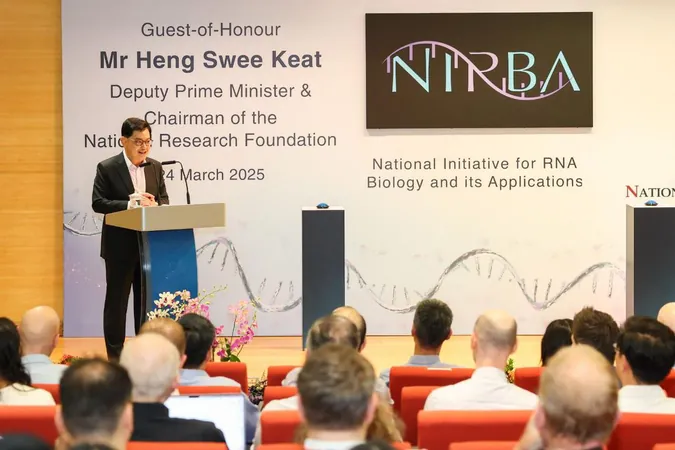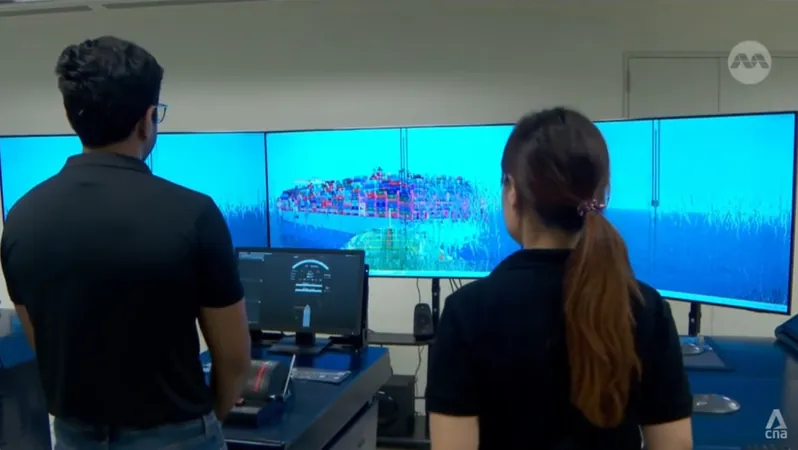
Singapore Unveils Ambitious $130 Million RNA Research Program to Revolutionize Healthcare
2025-03-25
Author: Wei Ling
Introduction
Singapore has just embarked on a groundbreaking journey in the biomedical field with the launch of a $130 million initiative aimed at harnessing the power of ribonucleic acid (RNA) for innovative vaccine development, disease therapy, and prevention. Named the National Initiative for RNA Biology and Its Applications (Nirba), this seven-year program is funded by the National Research Foundation (NRF) and represents a significant leap forward in Singapore's quest to solidify its position as a leader in biomedical research.
Significance of RNA Research
During the official announcement on March 24 at the National University of Singapore (NUS), Deputy Prime Minister Heng Swee Keat emphasized the importance of RNA research, citing Singapore’s successful mRNA vaccine rollout during the Covid-19 pandemic as a pivotal moment that demonstrated the life-saving potential of RNA technology. 'The rapid development and deployment of mRNA vaccines have changed the landscape of healthcare,' he stated, highlighting an increase in various RNA-based therapies now being tested for a plethora of conditions, including cancers and metabolic diseases.
Current State of RNA Therapies
By late 2023, over 25 RNA-based therapies had received approval from the US Food and Drug Administration (FDA), targeting infectious diseases, rare genetic disorders, and high cholesterol, while more than 125 additional therapies are currently undergoing clinical trials focusing on cardio-metabolic, neurological diseases, and cancer.
Understanding RNA's Role
RNA plays an essential role in all living organisms and many viruses, acting as a messenger that translates genetic information into proteins necessary for life. The potential of RNA technology has only begun to surface; Singapore, facing a rapidly aging population, is poised to meet rising demands for advanced therapies aimed at extending healthy lifespans.
Collaborative Research Framework
Nirba’s collaborative framework will bring together major research institutions, including NUS, Nanyang Technological University, and A*Star, to fortify Singapore's RNA capabilities. A new state-of-the-art 2,000 square meter laboratory space at NUS will serve as a central hub for researchers to collaborate and innovate, catering to biological, structural, chemical, and computational needs for their projects.
Key Research Areas
The program will focus on four key research areas: 1. Investigating how Asian genetic diversity impacts RNA biology related to diseases such as cancer and diabetes. 2. Exploring the ways chemical modifications on RNA can influence immune responses, aiding the body’s defense against infections. 3. Understanding the transportation of RNA molecules within cells to improve therapeutic targeting of diseased tissues. 4. Analyzing the mechanisms by which RNA-based drugs exert their effects and how they are metabolized, vital for the future development of RNA therapies and vaccines.
Diversity and Health
Professor Ashok Venkitaraman, the lead on Nirba, pointed out that genetic diversity among Asian populations presents unique vulnerabilities to diseases like diabetes and cancer. 'Addressing these issues, including cancer and cardio-metabolic diseases, will be critical for promoting healthy aging in our population,' he explained.
Funding and Training
Over the next seven years, the NRF will allocate funding not just for cutting-edge research, but also for training the next generation of researchers, attracting international talent, and fostering collaborative efforts within the local research community. DPM Heng remarked that Singapore’s commitment to genomics and precision medicine, exemplified by initiatives such as PRECISE-SG100K, lays a solid foundation for advancing RNA-based therapies.
Biomedical Landscape
The biomedical landscape in Singapore has evolved significantly over the past quarter-century, with nine out of 17 A*Star research institutes now emphasizing biomedical studies. The nation has strategically allied itself with global biomedical leaders like Pfizer, Novartis, and Sanofi, growing to host over 30 regional headquarters for top pharmaceutical companies.
Impact on GDP
In 2023, the biomedical sector contributed 2.55% to Singapore’s gross domestic product, and the industry has been expanding robustly, showing annual growth of 4.4% since 2015. DPM Heng concluded, 'Strengthening our biomedical research capabilities has measurable impacts on saving lives, especially evident during health crises, such as the rapid response during the Covid-19 pandemic.'
Conclusion
With its comprehensive strategy focusing on RNA research, Singapore is carving out a bright future where groundbreaking therapies could redefine the healthcare landscape and improve quality of life for millions. Keep an eye on this small nation as it leads the way in the next wave of medical breakthroughs!



 Brasil (PT)
Brasil (PT)
 Canada (EN)
Canada (EN)
 Chile (ES)
Chile (ES)
 Česko (CS)
Česko (CS)
 대한민국 (KO)
대한민국 (KO)
 España (ES)
España (ES)
 France (FR)
France (FR)
 Hong Kong (EN)
Hong Kong (EN)
 Italia (IT)
Italia (IT)
 日本 (JA)
日本 (JA)
 Magyarország (HU)
Magyarország (HU)
 Norge (NO)
Norge (NO)
 Polska (PL)
Polska (PL)
 Schweiz (DE)
Schweiz (DE)
 Singapore (EN)
Singapore (EN)
 Sverige (SV)
Sverige (SV)
 Suomi (FI)
Suomi (FI)
 Türkiye (TR)
Türkiye (TR)
 الإمارات العربية المتحدة (AR)
الإمارات العربية المتحدة (AR)